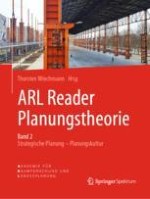
2019 | OriginalPaper | Buchkapitel
1. Einleitung – Zum Stand der deutschsprachigen Planungstheorie
verfasst von : Thorsten Wiechmann
Erschienen in: ARL Reader Planungstheorie Band 2
Verlag: Springer Berlin Heidelberg
Aktivieren Sie unsere intelligente Suche, um passende Fachinhalte oder Patente zu finden.
Wählen Sie Textabschnitte aus um mit Künstlicher Intelligenz passenden Patente zu finden. powered by
Markieren Sie Textabschnitte, um KI-gestützt weitere passende Inhalte zu finden. powered by